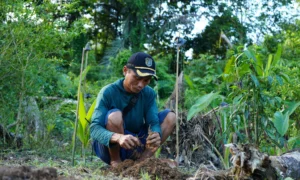Join us on an aromatic expedition through the fascinating world of coffee production as we shine a spotlight on two extraordinary countries: Brazil and Ethiopia. Beyond being just a morning pick-me-up, coffee takes us on a rich journey from one corner of the globe to another. These nations have captured our hearts with their distinctive flavors, vibrant cultures, and captivating coffee traditions. So, grab your favorite mug, and let’s delve into the secrets behind these top coffee-producing countries that are sure to awaken your senses and leave you yearning for that next perfect cup!
Introduction to the Coffee-Producing Countries
Originating in Ethiopia, coffee production has been a crucial part of the country’s economy for centuries. Today, Ethiopia is Africa’s second-largest coffee producer and ranks fourth globally.
On the other hand, Brazil is the largest coffee producer worldwide, accounting for over one-third of the global coffee supply. With a rich history dating back to the 18th century, Brazil is home to diverse coffee varieties, including Arabica and Robusta beans.
Brazil: The World’s Coffee Giant
As responsible for a staggering one-third of the world’s coffee production, Brazil plays a dominant role in the coffee industry. The coffee belt stretches from north to south, covering over half of the country and creating an ideal climate and terrain for coffee cultivation. With an estimated 5 million coffee farms across Brazil, the country exports the majority of its coffee, with the United States being the biggest importer.
Brazilian coffee offers a wide range of flavors, from light and fruity to rich and chocolatey blends, catering to all taste preferences. With over 3 million bags consumed domestically each year, Brazil’s coffee culture is vibrant, capturing the hearts of coffee enthusiasts worldwide.
Ethiopia: The Birthplace of Arabica Beans
The enchanting landscapes of Ethiopia hold a significant place in coffee history, being the birthplace of the Arabica bean. Ethiopian coffee is renowned for its quality, often boasting fruity and floral notes and complex flavors.
Colombia: Leading Latin America’s Coffee Production
Colombia, the world’s third-largest coffee producer, contributes significantly to the global coffee supply, especially in terms of Arabica beans known for their higher quality. The country stands out for its unique coffee-growing regions, often maintained by small-scale farmers, ensuring a sustainable and environmentally friendly production process.
Vietnam: The Fastest-Growing Coffee Exporter
Vietnam, ranked as the second-largest coffee producer globally, has experienced rapid growth in its coffee industry. A favorable environment, coupled with government support and foreign investments, has doubled coffee production since 2000. Vietnamese coffee’s strong and intense characteristics, combined with a high caffeine content, have garnered international acclaim, making it a favorite choice for many coffee enthusiasts.
India: A Coffee-Consuming Nation
India, a country with a deep-rooted coffee culture, consumes more coffee than any other nation in the world. With a history dating back to the 1600s, coffee production became a significant part of India’s economy during British colonization. Indian coffee, known for its rich flavor and aroma, finds its way into blends appreciated globally.
Indonesia: Home of the Robusta Bean
Following Brazil, Indonesia ranks as the world’s second-largest coffee producer. The country’s production includes a variety of coffee beans, with robusta beans being particularly prominent. Robusta beans are famous for their high caffeine content and robust flavor; they are often featured in espresso and strong coffee beverages. Indonesia’s coffee exports reach countries all over the world.
Honduras: A Growing Player in Central America
Honduras has emerged as a major player in Central America’s coffee production. Its ideal climate and geography contribute to growing coffee beans with rich flavors and aromas. Small-scale, family-owned farms using traditional methods ensure a high-quality coffee production process. Coffee plays a significant role in the Honduran economy, providing employment for over 400,000 people and contributing around 2% to the country’s GDP.
Conclusion
Our journey through the top coffee-producing countries has taken us from the birthplace of coffee in Ethiopia to the vast plantations of Brazil and beyond. Each country has a unique coffee culture, flavors, and traditions that enrich the global coffee experience. As you savor your next cup of coffee, remember the fascinating stories behind its origin and the impact it has on local communities and economies. Explore further into these countries’ coffee industries, and you’ll discover a world of flavors waiting to be explored.



































